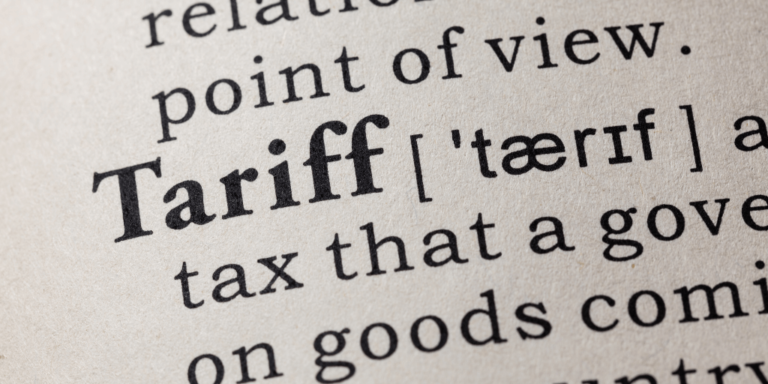Tariffs have been a central political talking point over the last few years as small business owners wonder how long-term trade wars will impact business. Both raw materials and finished consumer goods often come from different places worldwide, so tax increases on global trade have a ripple effect across all sectors.
United States Tariffs on Chinese Steel and Aluminum Impact the Global Supply Chain
In our hyper-digital and interconnected world, it’s easy to take global trade for granted –– especially with the rise of eCommerce. Online retailers make it possible for consumers to purchase goods from all over the world at competitive prices and have them shipped directly to their doors in weeks.
Unfortunately, trade wars and tariff hikes significantly impact global eCommerce –– even small business owners who only make domestic eCommerce sales. Chinese goods and raw materials are critical to most major industries. Steel and aluminum are major Chinese exports essential to the global supply chain, which means tariffs on Chinese goods ultimately result in higher prices everywhere.
What’s the Purpose of Tariffs?
Tariffs are taxes levied on imports, and they are an integral part of global trade. Countries impose tariffs to protect domestic brands and businesses –– and jobs –– from foreign competition, control the flow of goods in and out of the country, and generate revenue from international trade.
When tariffs on imported goods increase, foreign items get more expensive, incentivizing businesses to source domestically as much as possible. This, in turn, creates opportunities for domestic entrepreneurship since domestic small businesses can supply materials and goods at lower prices than foreign suppliers. Unfortunately, it takes time to build new domestic supply chains, so small businesses often have to set higher prices on consumer goods in the short term.
How Do Tariffs Work?
Not all imports are taxed. Each country has its own tax threshold on international business, referred to as de minimus value. Some countries tax almost all imports, while some countries tax nearly zero. For eCommerce sellers shipping internationally –– or sourcing materials from foreign suppliers –– it’s essential to be aware of import tax thresholds and which tariffs imposed will affect you.
Goods and Services Tax (GST) and Value-Added Tax (VAT)
A Goods and Services Tax is a tax on the consumption of foreign goods and services. It is typically integrated into the price of goods and paid by consumers to the government. GST was introduced to simplify a more complicated collection of excise taxes, service taxes, and duties.
Value-Added Tax is another type of consumption tax levied alongside or instead of GST. VAT was introduced to tax every part of the supply chain where value is added to goods and services. For example, apparel might be designed in Italy, manufactured in China, cut and sewn in Guatemala, and printed in the United States.
International Commercial Terms (Incoterms)
International commercial terms are international agreements that establish the tax obligations of businesses and consumers in global commerce. Incoterms are grouped by their method of transport: some apply to all forms of transportation, while others only apply to transport by water.
Buyers typically want to know the total cost of goods, including international taxes. But, since tariff laws can change rapidly, it’s often difficult to quote exact “landing prices” for consumers. That’s why it’s crucial to have a clear policy on international taxes, including who is responsible for paying import duties, and when.
Who Pays Import Duties?
Delivery duties paid (DDP) means that all import duties are paid in full before the items reach customs. This system simplifies delivery for consumers because once the items are approved, they are released for delivery.
Delivery duties unpaid (DDU) means that when a customer’s order arrives at customs, the customs office will contact the customer and require final payment of import duties. This kind of contact can sometimes catch customers by surprise, so if you plan to ship DDU, make sure your customers know ahead of time.
How to Prepare for Customs
It’s necessary to study and be prepared for international taxes when shipping to customers in other customers. If you don’t prepare, you and your customer can end up with an unpleasant surprise at customs, which you’re better off avoiding. Even worse, if you intentionally under-declare the value of your goods in an attempt to skirt taxes, you can end up suffering serious consequences for customs fraud.
Be prepared for customs with the following tips:
Learn the Tax Thresholds for Countries You Ship To
Again, not all countries tax imports, and some countries tax imports more heavily than others. Spend time studying what duties you’re responsible for, and consider talking with an expert on international trade law before shipping internationally.
Communicate Clearly With International Customers
Prevent unpleasant surprises at customs by publishing a clear and comprehensive tariff policy that your customers can easily understand. Keep your policy’s terms as simple as possible since your customers may not be fully fluent in your language. Also, make sure your policy is easy to find, possibly by including it as part of the international checkout process.
Consider Shipping Delivery Duties Paid
Customers who don’t often shop internationally –– and even many who do –– may get frustrated by dealing with customs to receive their goods. To reduce friction and attract repeat buyers, consider shipping DDP to avoid customer hassles.
Accelerate Your Cash Flow to Prevent Delays
Global eCommerce carries higher costs than domestic eCommerce. Navigating tax laws can be complicated, and minor oversights can lead to significant customer service headaches if you aren’t careful. By accelerating your cash flow with Payability, you can ensure that you cover all your international eCommerce expenses, whether you’re buying supplies or shipping your goods overseas.
Instant Access from Payability
Instant Access from Payability speeds up marketplace payouts for eCommerce businesses.
Stop waiting around for days or weeks to get your funds from eCommerce sales. Get next-day marketplace payouts with Instant Access. Payability gives you the money you need to expand your eCommerce business.
- Get Approved Quickly –– No credit checks required. Just apply online with your marketplace seller account to get your funds the same day.
- Get Your Money Daily –– You shouldn’t have to wait weeks for your money. Get payouts from your sales every day, including weekends and holidays.
- Stop Waiting For Transfers –– Get your money when you need it with Instant Transfer, Same-Day AC, or wire.
- Earn Cash Back –– Put your money to work for you. Get up to 2% cash back on every purchase you make with the Payability Seller Card.
Instant Advance from Payability
Instant Advance from Payability provides instant growth funding for eCommerce businesses that are ready to scale.
Don’t let slow money stop you from growing. Get up to $250k right now for inventory, marketing, and more as you expand your business.
- Forget the Credit Check –– Apply quickly and easily with your marketplace sales history and account health.
- Lighting-Fast Approval –– Skip paperwork headaches and long waiting periods. Apply online and gets funds in as little as one business day.
- Fast Transfers –– Don’t wait for slow money. Access your money when you want it with Instant Transfer, Same Day ACH, or wire.
- Cash Back –– Earn up to 2% cash back on every purchase with the Payability Seller Card.


